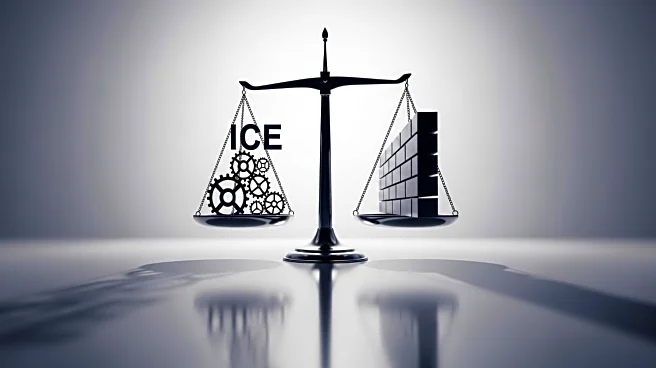What is the story about?
What's Happening?
Under President Trump, the Immigration and Customs Enforcement (ICE) agency has intensified its immigration enforcement efforts, leading to increased arrests and expanded authority for conducting raids. This has resulted in significant internal pressures within the agency, as reported by current and former ICE officials. The administration's push for higher daily arrest quotas has led to the detention of thousands of individuals without criminal records, including long-term green card holders and U.S. citizens. ICE personnel are experiencing burnout and frustration due to long hours and the reassignment of specialized agents from other investigative areas to immigration enforcement. The agency is attempting to alleviate these pressures by launching a recruitment drive to hire thousands of new officers, although this process is expected to take months or years.
Why It's Important?
The intensified immigration enforcement under President Trump has significant implications for U.S. immigration policy and the affected communities. The increased arrest quotas and expanded raids have drawn public criticism and raised concerns about the detention of individuals without criminal records. This approach has also impacted ICE personnel, leading to morale issues and potential risks associated with rapid recruitment. The broader societal impact includes heightened tensions in communities where ICE operations are conducted, as well as legal and ethical debates over the administration's immigration policies. The focus on immigration enforcement reflects a shift in priorities that could influence future policy decisions and public opinion on immigration.
What's Next?
ICE is expected to continue its recruitment drive to meet the administration's goals of hiring 10,000 new officers over the next four years. This effort is supported by a Republican-backed spending package that provides substantial funding for ICE operations. The agency's recruitment strategy includes a media blitz to attract applicants, although concerns remain about the potential risks of bringing in less qualified personnel. As ICE expands its workforce, the agency will need to address internal morale issues and public criticism of its enforcement tactics. The administration's immigration policies may face further scrutiny and opposition from civil society groups and political leaders, potentially influencing future legislative and policy changes.
Beyond the Headlines
The aggressive immigration enforcement strategy under President Trump raises deeper questions about the balance between national security and civil liberties. The reassignment of specialized agents to immigration enforcement may impact the agency's ability to address other critical issues, such as human trafficking and transnational crime. Additionally, the reliance on artificial intelligence for targeting addresses has led to mistakes, highlighting the challenges of integrating technology into law enforcement operations. The broader cultural and ethical implications of these policies may shape public discourse and influence the direction of U.S. immigration policy in the long term.














